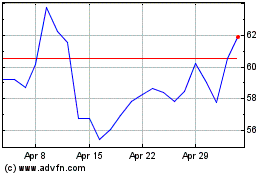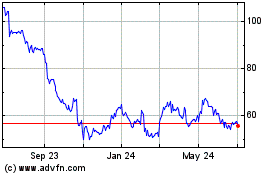Want to Invest in Lithium and Cobalt? Good Prices Are Hard to Find -- Update
June 19 2018 - 11:48AM
Dow Jones News
By Amrith Ramkumar
Investors in two of the hottest commodities in recent years face
a vexing problem: Reliable prices for lithium and cobalt are every
bit as rare as large deposits of the valuable ores.
Interest in the materials has soared on expectations that demand
will rise as they are used in a rapidly expanding number of
electric-car batteries. The market for the two metals has already
jumped to as much as $10 billion from about $4 billion two years
ago, according to estimates. Analysts project that figure could
double again by 2025.
But unlike most other commodities, lithium and cobalt don't have
actively-traded futures contracts tied to them. That means many
investors are forced to rely on costly services that give price
estimates, market participants say. But even those figures,
analysts say, can differ from the privately negotiated chemicals
prices used by large miners and Chinese battery manufacturers --
deals that make up a significant chunk of the market.
That's bad news for a nascent market that's already prone to
rapid price swings. The Global X Lithium & Battery Tech ETF is
down 14% this year after a 59% surge in 2017. Supply and demand
projections for lithium and cobalt can move dramatically because
they're tied to how quickly consumers will adopt electric cars -- a
trend still in its early stages that skeptics say is largely built
on hype given the history of disrupting long-entrenched habits like
driving.
All this raises the risk of unexpected volatility in prices.
While investors are starved for growth and returns after years of
low interest rates, the opacity in metal prices and fickle market
sentiment are keeping some away even as large companies like
SoftBank Group Corp. and Tesla Inc. make investments. It's why
asset-management firm Fiera Capital Corp. hasn't invested in
producers of the metals, said Nick Page, a portfolio adviser for
Fiera's European division.
"The market is quite opaque," he said. "It's difficult to take
any comfort from all of the different forecasts, which makes it
more risky."
Analysts say the situation benefits the biggest players in
commodities, like Swiss trading giant Glencore PLC, the world's
largest cobalt supplier, and global chemical heavyweights Chilean
Sociedad Quimica y Minera de Chile S.A. and U.S.-based FMC Corp.
and Albemarle Corp. Those firms have existing relationships with
refiners and battery makers concentrated in China, the industry's
dominant player. Buying shares of producers is currently the
easiest way for smaller investors to bet on battery metals.
While it's true that in other assets big players also tend to
have information advantages, it's especially dangerous for small
producers and investors in markets like lithium and cobalt that are
defined by largely speculative bets on future supply and demand.
That risk could limit investment in the industry, some analysts
said.
"Without going to China to see all the demand for battery
materials, it's really hard to get a handle on it," said Mathew
Lazarus, managing member at New York-based hedge fund Red Hook
Asset Management LLC, which owns shares of several lithium
producers. "That's the gating item, that investors have to take a
leap of faith that there's going to be all this demand when we
can't see it."
Finding dependable prices is more challenging for the materials
than other commodities because they have to be refined into
chemicals like cobalt sulfate or lithium hydroxide, adding to the
complexity because of the multitude of chemical grades and varying
prices for them.
Even the London Metal Exchange has struggled to launch contracts
for lithium and cobalt with standardized and transparent pricing.
Some market participants use the LME's physical cobalt metal
contract as a proxy, and the exchange said last October that it was
looking into cash-based contracts for lithium, cobalt and nickel
compounds.
But an LME spokeswoman confirmed to The Wall Street Journal that
some of these efforts have been abandoned because of a lack of
demand for some chemical compound contracts. The exchange is still
working on a cobalt contract using cash and a lithium contract, the
spokeswoman said.
Because commodity producers typically use futures markets to
hedge and guarantee prices for output, some analysts think a lack
of hedging contracts in lithium and cobalt could hurt new
miners.
Worries about oversupply have cooled the sector so far this
year. Lithium and cobalt companies have fallen even though prices
of lithium and cobalt chemicals used in batteries have largely
remained steady.
For now, investors have to sift through multiple supply and
demand reports, taking into account that there may be gaps in
pricing. They pay for services from a number of data providers,
including Metal Bulletin, Benchmark Mineral Intelligence or CRU
Group.
Yet even bullish investors remain anxious.
"We're keen on the space, but we still want to approach it with
caution, " said Robert Cohen, a portfolio manager at 1832 Asset
Management, which owns shares of Glencore and a few small lithium
companies. "We don't know how it's going to unfold."
Write to Amrith Ramkumar at amrith.ramkumar@wsj.com
(END) Dow Jones Newswires
June 19, 2018 11:33 ET (15:33 GMT)
Copyright (c) 2018 Dow Jones & Company, Inc.
FMC (NYSE:FMC)
Historical Stock Chart
From Mar 2024 to Apr 2024

FMC (NYSE:FMC)
Historical Stock Chart
From Apr 2023 to Apr 2024
